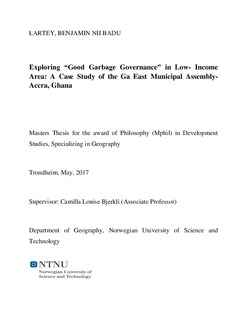| dc.description.abstract | The concept of governance since the late 1980’s has gained much prominence in the development arena especially when dealing with issues like solid waste. In line with the concept, this study explores UNDP’s term of “good garbage governance” by using the Ga East Municipal Assembly as its case study. It presents the changes that governance has brought to the Waste Management Department as well as the challenges the department faces in fostering good good governance.
The study was guided by some theoretical and conceptual framework. These include World Bank’s concept of Governance as well as Norman Long’s framework on Actor- Oriented Approach. Other concepts used in the research include the concept of Institutional Pluralism, Power, Environmental conflict, Environmental in (justice) and Inequality. The study further adopted an exploratory qualitative approach by using both primary and secondary sources of data. Interview, both semi- structured (5) and unstructured (7), as well as Field Observation and Focus Group Discussion (2) were used in producing primary sources of data. Documentary analysis was also used in producing secondary data for this study. In reaching research participants, the study relied on purposive, snowball, convenient and simple random sampling techniques.
The study reveals that the introduction of solid waste decentralization as a form of good garbage governance has brought in new actors into the management of solid waste; thereby leading to the reorganization of solid waste in the study area. However, much improvement has not been recorded as there exist a gap between what governance tends to achieve and what it actually achieve such as effective participation of all the actors in solid waste decision- making process, increase transparency and accountability, information sharing among others. This is as a result of the unequal power relations such as legislative state power vested in the hands of bureaucrats, work experiences as well as education that exist among the actors involved in solid waste management. This makes the elite able to still control the affairs of solid waste leading to the marginalization of the other actors; hence questioning the motive of good garbage governance. This limited stakeholder participation, hindered transparency, led to the misappropriation of solid waste funds, lack of trust from the community towards the bureaucrats as well as the lack of political will from the bureaucrats towards solid waste management policies.
The study recommends that the forms in which power exhibited itself should be identified and addressed in order to be able to improve upon solid waste management. In addition, national and municipal governments should make efforts to improve good garbage governance by ensuring an effective citizen participation, accountability and transparency, and fairness in decision making. Further, the study also entreats both national and municipal government as well as the households to be proactive and also see the prospects associated with the management of solid waste in terms of job creation, energy generation and revenue generation activity when dealing with solid waste matters. This calls for a revision of the National Environmental Sanitation Policy by giving equal opportunities to the various actors involved in solid waste management as well as intensifying its educational programs to increase awareness among the citizens. | nb_NO |
